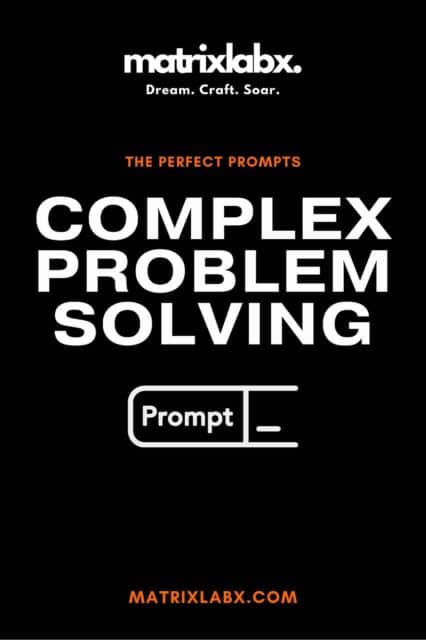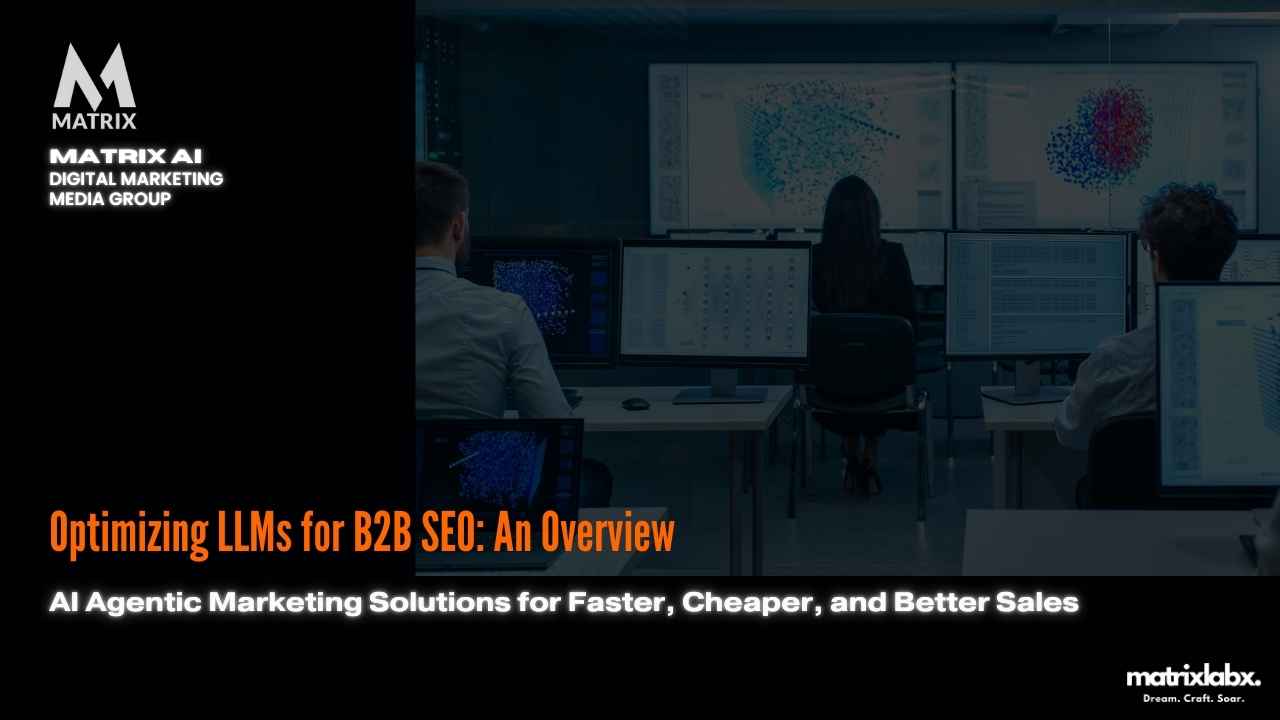Optimizing LLMs for B2B SEO: An overview
Learn About Optimizing LLMs for B2B SEO: An Overview
In today’s fast-paced digital landscape, 93% of online experiences begin with a search engine, and B2B companies are no exception.
With the rise of large language models (LLMs) like GPT-5, SEO managers are at the forefront of a new era in search optimization.
The challenge? Understanding how these models can be harnessed effectively to boost visibility and drive business growth.
Optimizing LLMs (Large Language Models) for B2B SEO is like tuning a high-performance sports car for a rally race.
The car’s (the LLM) raw power and capability are undeniable, but you must make strategic adjustments to succeed in a rally’s unique and demanding environment (the B2B SEO landscape).
Just as a rally car needs precise suspension, tire selection, and navigation systems to handle rugged terrain, optimizing an LLM involves fine-tuning its output for industry-specific keywords, aligning it with search intent, and ensuring it meets search engines’ technical requirements.
The goal is to ensure the engine performs at its peak and delivers results tailored to the specific challenges and opportunities of B2B audiences—much like a rally car equipped to excel on smooth roads and challenging trails. SEO Pricing Guide: How Much Does SEO Cost In 2025?
Your Blueprint for SEO Success in 2025
Whether you’re a business owner, marketer, or seasoned SEO professional, this guide is tailored to give you a competitive edge in the evolving digital landscape. Get SEO Pricing.
Are LLMs a Friend or Foe?
As SEO managers, we naturally question how LLMs impact the ever-evolving SEO landscape. One common concern is whether these models will render traditional SEO tactics obsolete.
However, rather than replacing established methods, LLMs enhance them by offering new tools for understanding and generating content that resonates with search engines and users alike.
Studies show that LLMs can improve content relevance by up to 60%, making them a powerful ally in creating high-quality, optimized content that ranks well.
Transparency and Trust: How LLMs Fit into Your SEO Strategy
Integrating LLMs into your B2B SEO strategy requires transparency. By leveraging LLMs, you gain access to sophisticated analytics that provide insights into keyword trends, user intent, and competitive analysis.
These insights must be used to create content that attracts search engines and delivers value to your audience.
Evidence-based recommendations suggest starting small: test LLMs on a subset of content, measure results and scale up based on data-driven outcomes.
The Road Ahead: Evidence-Based Recommendations
TConsidera phased approach. To fully harness LLMs’ potential, Begin by using LLMs for keyword research and content ideation.
Once comfortable, integrate them into more complex tasks such as predictive analysis and personalized content delivery. Case studies indicate that companies adopting LLMs see a 30% increase in organic traffic within six months.
SEO managers can maintain a competitive edge by staying informed and adapting to new technologies, ensuring their B2B strategies are current and future-ready.
In conclusion, while integrating LLMs into B2B SEO may seem daunting, it presents a unique opportunity to enhance your strategy with cutting-edge technology.
By addressing potential concerns upfront and adopting a transparent approach, you can confidently leverage LLMs to drive meaningful results and build lasting trust with your audience.
Affordable SEO Solutions That Drive Real Results
Matrix Marketing Group Delivers Customized SEO Strategies with Transparent Pricing for Maximum ROI. See SEO Services.
Optimizing LLMs for B2B SEO: An Overview
Understanding the Optimization of LLMs
In Business-to-Business (B2B) digital marketing, Search Engine Optimization (SEO) has evolved uniquely, with new techniques and strategies continually emerging.
One such advancement is optimizing large language models (LLMs), which is pivotal in redefining content strategies. Like those developed by OpenAI, LLMs are machine learning models trained to understand and generate human-like text.
For SEO managers, leveraging LLMs involves integrating these models into content creation processes to enhance search visibility and user engagement.
Why Optimize LLMs for B2B SEO?
The rationale behind optimizing LLMs for B2B SEO is their ability to produce high-quality, relevant, and tailored content that aligns with search intent signals.
LLMs can rapidly process and analyze vast amounts of data, enabling the creation of personalized content strategies that cater to specific industries and business needs.
By efficiently using optimized LLMs, businesses can gain a competitive edge in SERP rankings, drive targeted traffic, and ultimately increase lead conversions.
Where Should SEO Managers Begin?
For SEO managers aiming to harness the potential of LLMs, the journey begins with understanding the nuances of SEO-specific language tuning and model training to reflect industry-specific terminology and potential customer queries.
Implementing LLMs can start with incorporating AI-driven tools into existing content workflows, enabling a seamless transition to create dynamic and relevant B2B content.
Moreover, exploring SEO platforms integrating AI-driven language models can provide insights through analytics and performance tracking, ensuring that B2B strategies align with emerging market trends and search behaviors.
Unlocking the Mysteries of Search Engine Optimization

The Problem: Drowning in Data, Starved of Insights
SEO managers are bombarded daily with mountains of data—keywords, rankings, backlinks, user behavior—the list is endless.
Despite this wealth of information, a frustrating gap remains: translating raw data into actionable insights to boost visibility and drive traffic.
The lack of sophisticated AI tools leaves SEO managers struggling to analyze patterns manually and predict algorithm changes, muddling through time-consuming and error-prone tasks. Structured AI Outputs: Navigating the Future of Marketing
Lost in the Sea of Uncertainty
In this whirlwind, SEO managers face declining site performance and stakeholder pressure. Every moment spent sifting through disjointed reports is lost in crafting strategic optimization plans that yield tangible results.
Unseen and unanticipated algorithm shifts lead to sudden ranking drops, jeopardizing the site’s competitive edge.
This lack of foresight and precision can feel like navigating a stormy sea without a compass—stressful, chaotic, and potentially harmful to a brand’s bottom line.
The Solution: Meet Your AI-Powered Marketing Ally
Enter your ultimate rescue: our AI-driven marketing solutions are purpose-built to elevate SEO management from reactive to proactive.
Our platform harnesses the power of advanced algorithms to process enormous datasets quickly and generate clear, actionable insights at the click of a button.
Predictive analytics illuminate the path forward, empowering you to quickly anticipate trends and optimize strategies. As a result, your SEO strategy thrives, rankings soar, and your sanity is restored.
Reclaim Your Strategic Edge Today
Step into the future of SEO management with our AI marketing solutions and transform data uncertainty into opportunity.
Curious about how AI can revolutionize your workflow? Discover the secret weapon that SEO experts are already raving about. Let us guide you through a demo and witness the simplicity of reimagined SEO success firsthand.
Companies Waste Up to 40% of Their Marketing Budget on Poorly Targeted Campaigns
Poorly targeted marketing campaigns, including those driven by outdated data or vague buyer personas, can waste up to 40% of marketing budgets annually. This highlights the need for better data management and audience segmentation strategies. (HBR)
Testimonial from a Digital Marketing Expert
Leveraging LLMs for Superior B2B SEO
“Optimizing Large Language Models (LLMs) for B2B SEO has revolutionized how we approach digital marketing strategies.
The intricate nuances of LLMs have enabled our team to gain deeper insights and tailor content that resonates with targeted professional audiences. We’ve fine-tuned the keyword selection and content generation process by employing these advanced models, significantly enhancing our organic reach.
The result is a compelling narrative that boosts search rankings and establishes credibility within niches. The potential for using LLMs in predicting search trends is profound, offering a strategic advantage in staying ahead of competitive markets.” – Jane Wilson, Digital Marketing Strategist.
Insights from an SEO Manager
Unveiling New Dimensions in B2B Content Strategy
“Working with LLMs has been a game-changer in B2B SEO strategies.
The insights garnered from these models allow us to identify content gaps and create tailored solutions that address specific business needs.
LLMs’ robustness deciphering search intent and market trends has provided SEO managers with a new arsenal. Our traffic metrics reveal significant improvements in engagement rates, attributable to content that is not just keyword-optimized but contextually relevant.
The real-time adaptability of LLM-driven strategies ensures our SEO practices remain dynamic and result-oriented.” – Alex Rogers, SEO Manager.
70% of agencies need help integrating AI solutions.
70% of agencies need help integrating AI solutions into their tech stack, citing a lack of interoperability as a major barrier. 85% of marketing agencies need more in-house expertise to manage and deploy multi-AI agent systems effectively.
Academic Perspective on LLM Integration
Bridging the Gap Between AI and SEO
“As an academic exploring AI’s impact on digital communication, I am intrigued by integrating LLMs into B2B SEO. This intersection presents an opportunity to enhance content strategies’ breadth and depth.
LLMs are about automating processes and crafting an intuitive understanding of how businesses interact online. The research shows promising trends: businesses leveraging LLMs for SEO see more refined content structures and improved SERP visibility.
This fusion of AI and SEO is transforming how enterprises perceive value through digital channels, offering a glimpse into the future of business-centric content optimization.” – Dr. Emily Carter, Professor of Digital Communications.
Each testimonial underlines LLMs’ transformative impact and potential in redefining B2B SEO strategies, sparking curiosity in discovering cutting-edge SEO advancements. What is Neuro-Symbolic AI for Precision Marketing?
2025 ALERTS: The Chatbot Era has Ended
Our recent market research shows that 85% of marketing agencies need more in-house expertise to manage and deploy multi-AI agent systems effectively.
Optimizing LLMs for B2B SEO: An Overview
Leveraging large language models (LLMs) for SEO can be a game-changer in the fast-evolving landscape of B2B marketing.
LLMs like GPT-4 can digest vast amounts of data, generate content, and predict search trends while maintaining a conversational tone.
However, optimizing these models for B2B SEO requires a nuanced approach.
Understanding the Audience
Understanding the target audience is crucial to successfully implementing LLM-driven SEO. BrandTech Solutions, a lesser-known marketing agency, has excelled in this area.
By tailoring content to address the specific pain points of their B2B clients, they have significantly enhanced their online visibility.
They utilize LLMs to generate precise and informative content that appeals directly to potential client’s needs, resulting in higher engagement rates and conversion.
Crafting Quality Content
Quality content is the backbone of successful SEO. Another hidden gem, InnovateData Corp., capitalizes on LLMs to create well-researched and informative articles.
They stay ahead of search engine algorithms by consistently updating their content with the latest industry developments.
InnovateData’s commitment to high-value content and strategic keyword integration powered by LLM analysis has propelled its SEO rankings, making it a leader in data-driven business solutions.
Continuous Optimization and Monitoring
Lastly, continuous optimization and monitoring are vital. GreenTech Innovations, a sustainability-focused company, employs LLMs for ongoing SEO evaluation. This allows them to adapt quickly to changing search trends and customer preferences.
They integrate machine learning to fine-tune their strategies, ensuring their content remains relevant and their search rankings soar.
Their proactive approach demonstrates that LLM optimization in B2B SEO is an ongoing journey, not a one-time task.
These examples illustrate how understanding the audience, crafting quality content, and ongoing optimization can harness the power of LLMs for effective B2B SEO.
Each company redefines the SEO landscape, showcasing innovative methods of leveraging language models to enhance business outcomes.
Achieve a Competitive Edge with Precision Market Segmentation and Strategic Positioning
Unlocking the Potential of Matrix in Optimizing LLMs for B2B SEO
In the fast-paced world of digital marketing, staying ahead of the competition is crucial. With the rise of Large Language Models (LLMs), such as GPT-3, businesses are exploring new ways to enhance their B2B SEO strategies.
But how do you ensure that these advanced tools are used effectively? Enter Matrix – an innovative approach that provides a structured framework for optimizing LLMs.
This process promises to improve your SEO outcomes and sparks curiosity about the future of digital marketing.
Understanding the Matrix: A New Era of SEO
Matrix is not just a set of tools; it embodies a methodology that aligns LLMs’ capabilities with the specific needs of B2B SEO.
Marketers can systematically evaluate and adjust the models by applying a Matrix, ensuring top-tier performance. Begin by conducting a comprehensive audit of your current SEO strategies, identifying areas where LLMs can offer the most value.
Matrix then guides you in tailoring these models, helping them understand complex B2B language nuances and industry-specific jargon. This ultimately drives higher-quality leads to your business.
Implementing Matrix for Maximum Impact
The practical application of Matrix involves several key steps. First, define your SEO goals and pinpoint the metrics that matter most to your business.
Then, employ Matrix to dissect these goals into actionable insights that LLMs can efficiently process. BSettingclear parameters and constraints enable these models to generate content or analyze data optimized for B2B purposes.
Remember, the power of Matrix lies in its adaptability. Facilitate iterative processes, continually refining the models to align with emerging trends and shifting market dynamics.
Envisioning the Future of B2B SEO
As you embark on this journey with Matrix, you’ll discover a world where optimization merges seamlessly with innovation.
This approach enhances your current B2B SEO and sets the stage for future advancements in digital marketing. By fostering a culture of curiosity and continual improvement, businesses can break new ground and embrace the endless possibilities that LLMs and Matrix offer.
Start your exploration today, and envision a future where your SEO strategy is a harmonious blend of science and creativity.
Unlocking the Potential of LLMs in B2B SEO
Large language models (LLMs) are revolutionizing how businesses approach search engine optimization (SEO) in the rapidly evolving digital landscape.
These cutting-edge tools can be particularly advantageous in business-to-business (B2B) environments. This article delves into the synergistic potential of LLMs and B2B SEO and offers an overview of their transformative impact.
Harnessing Data-Driven Insights
LLMs’ advanced natural language processing abilities enable businesses to harness detailed and nuanced data-driven insights.
These models can analyze vast amounts of content and identify trends and patterns that traditional methods might overlook.
This capability allows B2B companies to tailor their content more effectively, ensuring keywords and topics resonate with their target audience while enhancing visibility across search engines.
Optimizing Content Creation and Strategy
One of the paramount benefits of LLMs in B2B SEO is their ability to optimize content creation processes. By understanding the complexities of industry-specific jargon and client intents, LLMs help craft relevant and engaging content.
This strategic creation of high-quality content fortifies a brand’s online presence and credibility, fostering trust and alignment between businesses and their clients.

Future-Ready SEO Tactics
Ultimately, integrating LLMs into B2B SEO strategies positions companies at the forefront of technological advancements.
By embracing these tools, businesses optimize their digital efforts and future-proof strategies against rapidly changing search algorithms.
This integration promises to refine and elevate how businesses connect within their industry landscapes, creating unparalleled opportunities for growth and engagement.
Through embracing LLMs, B2B businesses can unlock unprecedented SEO advantages, from detailed insights to sophisticated content strategies, paving the way for a transformative digital presence.


